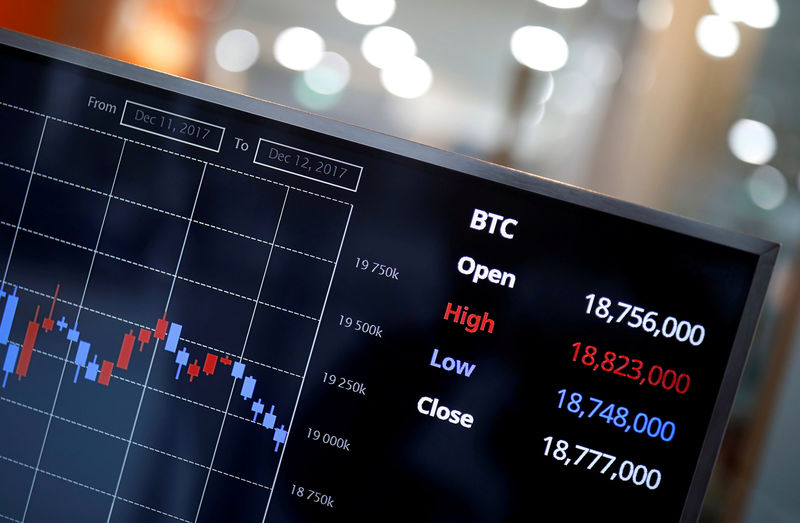By Tom Wilson
LONDON (Reuters) - When bitcoin was born it was a symbol of counterculture, a rebel currency with near-anonymity and a lack of regulation. A decade later, there are growing signs it's entering the establishment its creators sought to subvert.
As the cryptocurrency has surged in value bigger investors, from trading firms to hedge funds, have increasingly turned to exchanges regulated in traditional financial centers. They are buying bitcoin futures to gain exposure to the asset while avoiding the hacks and heists that plague the industry.
The crypto market, associated by many with the dark web, money laundering and the Wild West, is beginning to be discussed by financiers in the same breath as derivatives, hedging instruments and compliance.
Investors plowed record levels of money into bitcoin futures at regulated exchanges in the United States and Britain last month, hungry for a piece of the action but seeking the kind of protection that will satisfy their compliance officers.
Between March and May, bitcoin more than doubled in price, an ascent peppered by double-digit price swings reminiscent of its 2017 bubble, which was driven by smaller retail investors.
During that period, Chicago-based CME Group (NASDAQ:CME) Inc's average daily volumes of futures contracts climbed over seven-fold to a record $508 million in May. The number of open interest contracts - those that haven't been settled - also hit a record.
CME said bitcoin's price gains, and the subsequent increase in volatility, attracted new investors seeking to hedge risk.
Crypto Facilities, a London-registered platform bought this year for over $100 million by major U.S. cryptocurrency exchange Kraken, said bitcoin futures daily trading volumes jumped over three-fold from March to a record $84 million in May.
In a sign of the growing mainstream market, the owner of the New York Stock Exchange, Intercontinental Exchange Inc (ICE (NYSE:ICE)), plans to offer bitcoin futures in the coming months through a new crypto-trading platform, Bakkt.
"It's logical they (institutional investors) would want to be moving in this direction, especially considering their size and how much more there is at stake," said Joel Kruger, currency strategist at LMAX Exchange Group.
HEDGING INSTRUMENT
Futures - financial contracts that lock buyers and sellers into trading an asset at a set date and price - are seen as key components of any mature market, as they boost market liquidity and allow investors to bet on the direction of prices.
"It's a useful hedging instrument," said Daniel Matuszewski, head of trading at Goldman Sachs-backed crypto firm Circle. "Futures are much easier to trade, much easier to use for hedging, much easier to get leverage on."
Playing out in the spiking demand is the emergence of a twin-track global bitcoin futures market - on "onshore" exchanges like CME and "offshore" exchanges, which are more lightly regulated and still command the bulk of the multi-billion-dollar daily market.
Onshore exchanges - those regulated in established financial centers - are usually subject to strict checks on governance, technology and client vetting. They demand a high degree of transparency.
Offshore platforms, in contrast, are typically registered in jurisdictions with less onerous rules. They tend to accept business from investors who can sign up with few checks on their identity or the provenance of their funds.
Larger investors, bound by strict compliance rules, are heading to regulated platforms in financial hubs like CME, according to industry players. Traders with more tolerance for risk - including retail investors from north Asia and companies earning money in cryptocurrency, from miners to gaming firms - use of offshore exchanges.
"Offshore exchanges aren't really exchanges - they are more like private markets," said Vladimir Jelisavcic of trading firm Cherokee Acquisition in New York.
(GRAPHIC: Hedging bets: Traders lap up bitcoin futures - https://tmsnrt.rs/2QPWmsE)
'STARS HAVE ALIGNED'
Offshore exchanges have offered bitcoin futures since as early as 2011. One of the biggest, Seychelles-registered BitMEX, said it now accounts for over 65% of global cryptocurrency derivatives trading. Trading volumes were $4.3 billion in May, it said.
BitMEX CEO Arthur Hayes said, however, that larger investors were being increasingly drawn to onshore exchanges like CME.
"It's the perfect product (for bigger investors) - it's U.S.-dollar based, they never have to touch actual bitcoin, it's financially settled," he said.
The launch by CME and rival Cboe Global Markets in December 2017 marked the first time mainstream exchanges offered cryptocurrency derivatives.
They initially faced tepid demand. Cboe said in March, when bitcoin languished below $4,000, that it planned to discontinue its futures, with the final contracts expiring this month.
For their part, CME's futures have typically seen thin liquidity and high barriers to entry for smaller investors, said Ricky Li of crypto trader Altonomy in New York.
The growing gap in the market for futures from onshore exchanges is stimulating growing competition and attracting new entrants, such as ICE.
Sui Chung, head of cryptocurrency pricing products at Crypto Facilities, said compliance-wary institutional investors had been assessing the various futures products offered by regulated exchanges for some time, as they awaited a spike in prices to allow them to enter the market.

"This is the first time those stars have aligned," he said.